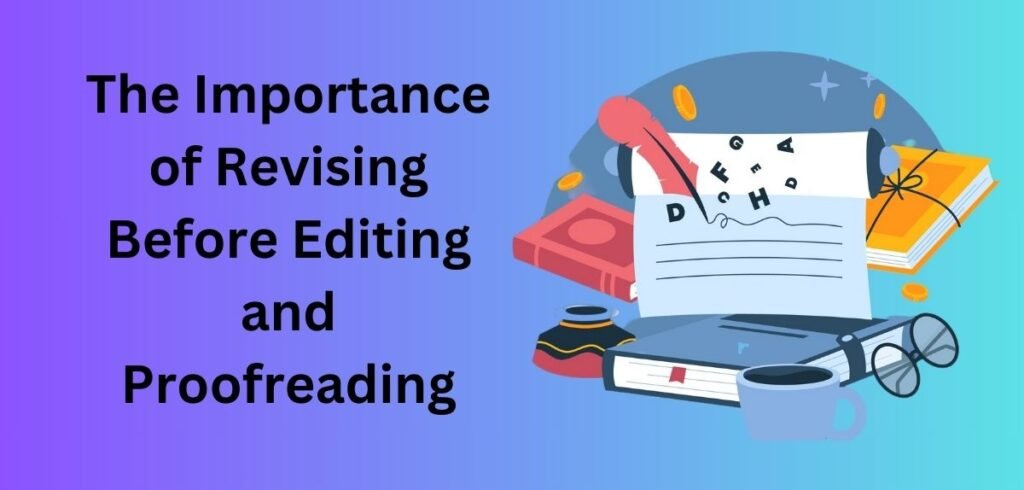Revising is an opportunity to reconsider our topic, our readers, and our organisation at the deepest level of meaning — Donald M. Murray.
Have you ever spent hours creating the ideal article for a Proofreading Course, only to find that some portions fell short? Or perhaps you sent in a paper that seemed like a masterwork and then had red marks covering it? If this sounds familiar, you’re not alone. Many of us rush through the revision stage, anxious to reach the last proofreading and editing polishing levels. But think about why it is essential to prioritise revision before working on those final stages. Mastery of the craft of writing depends on knowing the distinctions between Editing vs Proofreading vs Revising.
Understanding Revising, Editing, and Proofreading
First, let’s define what we mean by revising, editing, and proofreading, terms that are sometimes used synonymously but differ. Revising means looking over and changing your work. It’s about asking, “Am I making my point? Is this the ideal approach to arrange my points of view?” Major processes occur here—restructuring paragraphs, adding new sections, and altering the thesis.
Editing, on the other hand, focuses primarily on style and clarity. It emphasises sentence structure, word choice, and voice and is more about smoothing out the language. Proofreading is the last sweep for small mistakes—spelling, grammar, and punctuation issues that escaped the preceding phases.
The Effect of Skipping Revisions
Imagine you are baking a cake but decorating it before ensuring it has risen correctly or tastes well. It does not make much sense. This is true in writing also. If you start straight with editing and proofreading before carefully rewriting, you may find yourself polishing parts of the text that you hardly need for it!
Statistics show that the revision process may greatly improve writing quality. According to a study by the Writing Centre at the University of North Carolina, in 75% of cases, students who participated in intensive rewriting were able to raise their marks by at least one letter mark. This emphasises not only the need for editing but also how it affects the finished work.
How to Revise Effectively
How, then, can you make sure you are improving with your revising skills? Here are several techniques:
Take a Break
Though it sounds contradictory, temporarily away from your work could help you to see things differently. One can change even with a little break.
Read Aloud
This traditional method is brilliant. When you read your work aloud, you have to slow down, which can help you find problems with flow and clarity that your eyes would overlook when reading silently.
Get Feedback
Get comments and feedback; never undervalue the ability of a second or third pair of eyes. Getting comments—from a friend, a colleague, or a writing group—can provide fresh ideas and point out areas that might demand more effort.
Focus on Structure
See things from a larger perspective. Is the paragraph sequence logical? Does one area logically lead to the next? Sometimes, a little reorganisation can improve coherence.
Quick Poll
How often do you revise your writing before considering it final?
- Always
- Sometimes
- Rarely
- Never
Editing and Proofreading: The Last Steps
Editing and proofreading become considerably more successful once you have entirely revised. You are not wasting time fixing sentences that might be cut off. Instead, you should concentrate on perfecting your work to let it sparkle. Here is when your awareness of the subtleties between proofreading and editing becomes vital. Editing can mean changing your sentences to guarantee each word serves a function and improves flow and clarity. Conversely, proofreading is your last resort against typos and grammatical mistakes. This is your chance to guarantee that your paper or work presents itself perfectly and communicates.
Conclusion
Editing is the most critical process in the enormous scope of writing. It forms the basis of all that comes after. Spending time on editing guarantees that proofreading and editing will perform as they should, polishing and perfecting. After all, the goal isn’t just to write but to write well. Consider the courses The Knowledge Academy offers when you need to improve your writing, revising or proofreading skills. What strategies do you find most helpful in the revising phase? Drop a comment below, and let’s discuss!
For more information visit: The Knowledge Academy.

